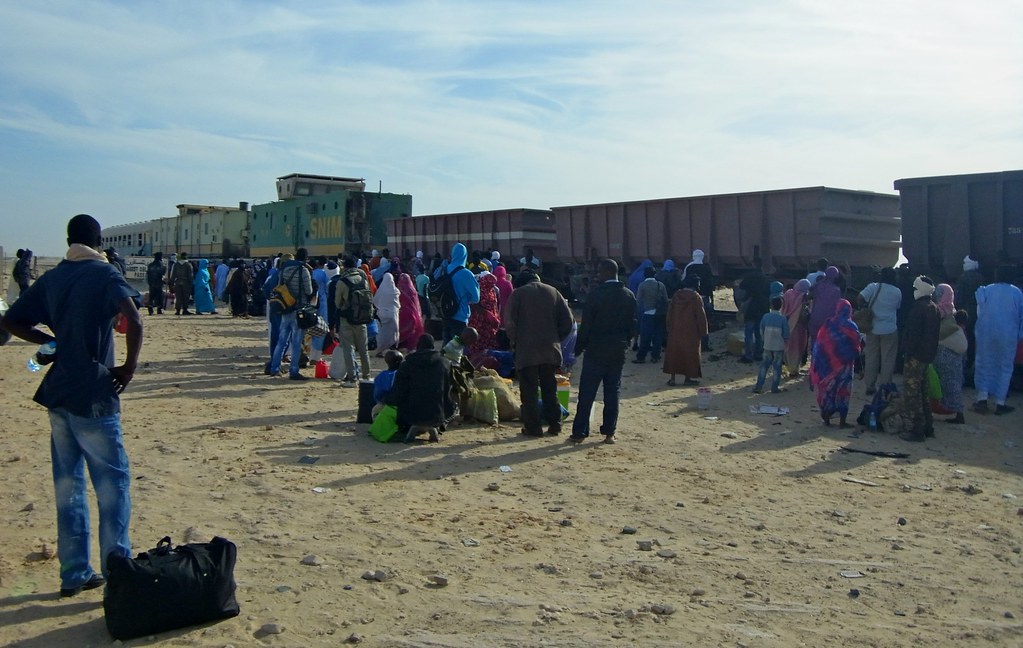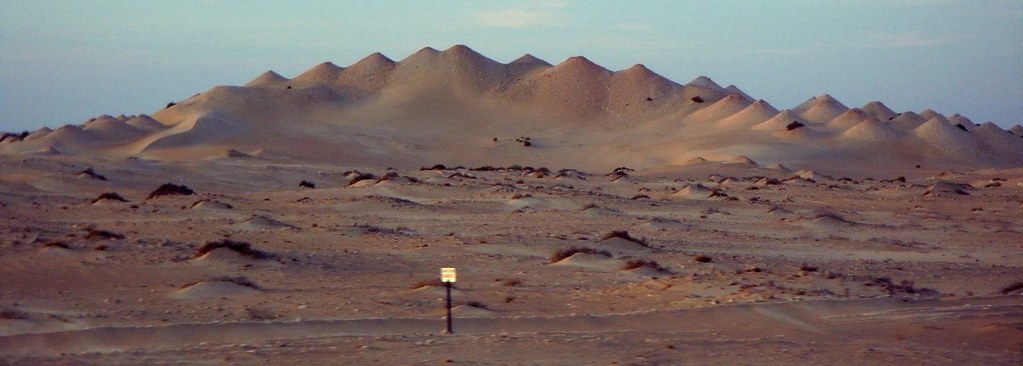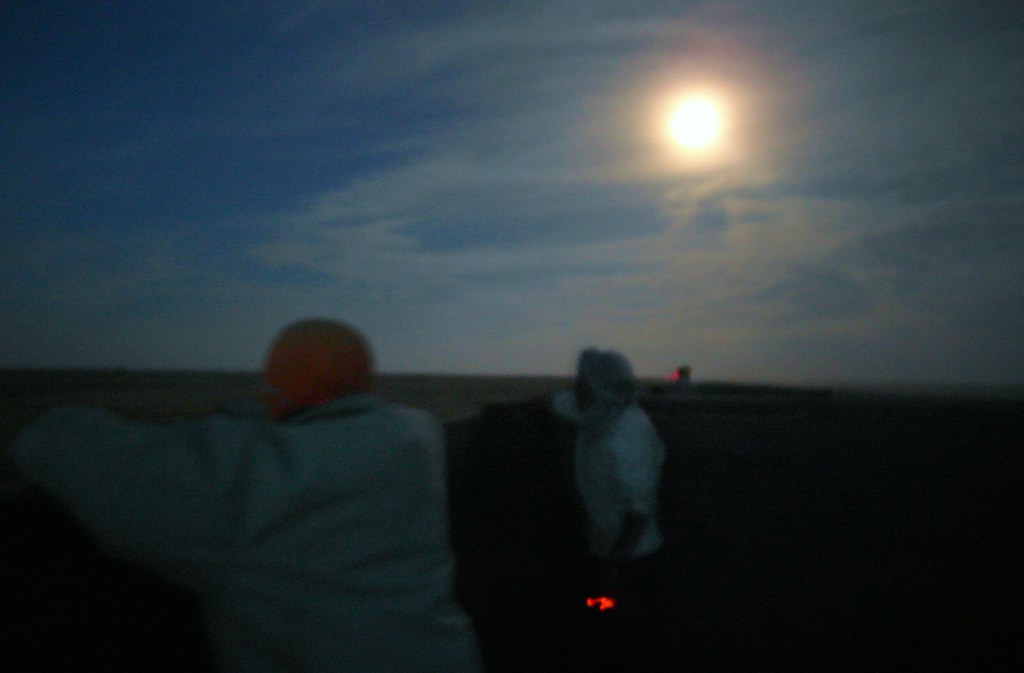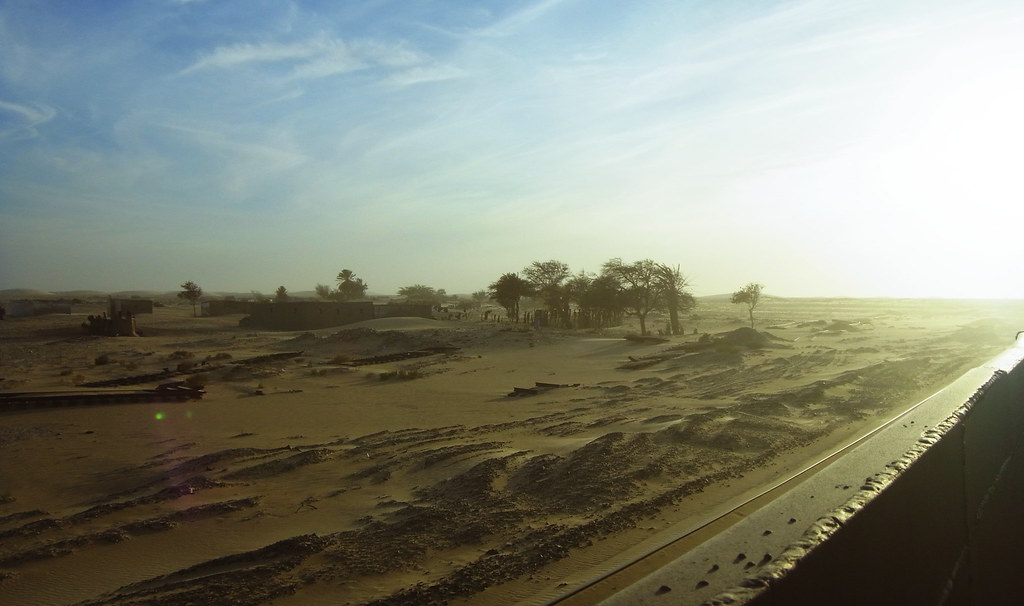
I feel the urge to pinch myself; am I really going to do this? The train isn’t here yet (although it should be), and the madness of what I’m about to do hasn’t really sunk in either. This morning, I bought a bunch of dates and scoured Nouadhibou’s market – which has a strong sub-Saharan, black African feel to it – looking for garbage bags, which proved to be a futile mission. One look at the rubbish in the streets should’ve been enough to make me realize that garbage isn’t put in bags here, let alone collected; it’s simply thrown out in the street, to be picked up by the wind, children, or wandering goats. Back at taxidriver / host Boum’s house, his son Hamud turned out to have taken one of my cookies. His mother was about to get really angry with him, but since I had intended to leave the cookies for him (and his parents) anyway, I pretended that I gave him permission to take the cookie. It’s rewarding bad behaviour, I know, but in the 12 hours I was there, he’d already charmed me… Early in the afternoon, Boum takes me to the train station (it turns out to be just a building along the railway line, without a platform). There, the police promtly take my passport. I fear that I’ll have to pay bribes, but the officer ensures me all will be fine. After filling out a “fiche” (a form with all my data on it; all West African governments seem to love them) and about half an hour of casting nervous

glances at the officer guarding the little room into which my passport has been taken, I get it back; apparently they just wanted my data. During the long wait for the train, the sun is burning down on me and the sand being whipped up by the wind starts to irritate my skin. I buy a turban at the little supplies store in the station, and get the store employee to wrap it for me. It looks pretty good on me, if I may say so myself. Finally, more than two hours after its scheduled departure, the train arrives. Three diesel locomotives chug by; five minutes later, the lone passenger car, at the very end of the train, becomes visible. Inbetween are somewhere between 1.6 and 2.3 kilometers of open-topped freight cars. This is Mauritania’s economic lifeline; the iron ore train – one of the longest trains in the world – on a continuous journey back and forth between the mines of Zouerat, deep in the Sahara desert, and the port of Nouadhibou. The number of passengers is greater than the number of seats in the single passenger car, so a few brave (or foolish) boys jump up and climb through the windows before the train has well and truly stopped, just to get a good seat. No such antics for me; in fact, I won’t bother with the passenger car at all. I haven’t paid for a ticket anyway. I will join the commuting mineworkers travelling to work for free, riding in the open-topped freight cars.
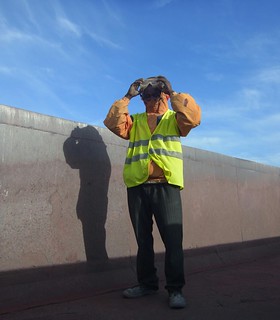
I spot two friendly looking guys climbing into one of the cars, and decide to join them. I hand them my backpack, climb the narrow ladder, and jump into the freight car. It’s all rust-coloured metal, with a few holes here and there, and a thin layer of reddish iron ore dust on the bottom. Other than that and our personal belongings, the cars are completely empty. One of my newfound travel companions is named Mustapha. He’s half Mauritanian and half Senegalese, and used to be an Army Engineer; I can’t quite make out if this was in the French or the Senegalese military. Either way, he’s now working at the mines in Zouerat, while his family lives in Senegal. I never find out the name of my other travel companion; judging by his appearance, he’s a white Moor, but he doesn’t speak French and I don’t speak Arab. Mustapha finds out he’s not an employee of the mines, but lives in a desert town along the route. He’s clearly not the only person using the train to get himself and his belongings home; people are manually loading all kinds of household appliances, including whole refridgerators, into the cars around us; quite a feat if you consider that the walls of the freight cars are some 3 meters above the ground! Some time after climbing aboard, there’s a distant rumble, like the sound of thunder. Mustapha gives me a warning sign, which is just about in time; with a massive shove that nearly has me flying through the car, the train starts moving, some two and a half hours later than planned. At first there’re some scrubs dotting the landscape; the locals call this part of the desert ‘sahel’, Arab for ‘coast’. In the Western world that term is only used for the Southern border between the Sahara desert and the savannah regions of sub-Saharan Africa, but locals seem to use it for any lightly vegetated area at the

edge of the desert. As the sun sets, the increasingly empty landscape turns into an abstract painting of silver, gold, orange, purple, and blue, with the train’s dust clouds being rendered a bronze haze. I try to shelter from the dust by sitting down in the cargo wagon, but it doesn’t matter; I can still see the layer of ultra-fine sand accumulate on my clothes by the minute, so I tighten my turban, fix my sunglasses, and get up again to enjoy the otherworldly views. We pass sand dunes with crazy shapes, like sleeping dragons turned to dust, and the occasional settlement with impossibly tiny, rickety shacks made of some old planks, huddled around a few sorry-looking trees. The train turns its back on the setting sun and heads East, straight into the desert. On the left hand side of the train, the heavily mined border with the Western Sahara is just a few meters away from the train tracks. When Spain gave up their colony of Rio de Oro, Mauritania wanted to confiscate it, but the train was (and is) the country’s economic lifeline and runs just along the border for over a thousand kilometers, making it easy for the Saharawi independence fighters to cripple Mauritania’s economy by sabotaging the railway. As we move further inland, the landscape becomes less diverse – but somehow no less interesting. The subtle differences in the small dunes, the colours, the stones, the texture of the sand… in this incredible expanse of nothing, I find endless variations and patterns that keep me staring, absorbing for hours. Suddenly the geometric, repeating patterns in Arab visual arts make perfect sense, even though (or perhaps exactly because) they don’t represent anything concrete. The same goes for the endlessly sinewy vocals in Arab music, which had previously annoyed me to no end.
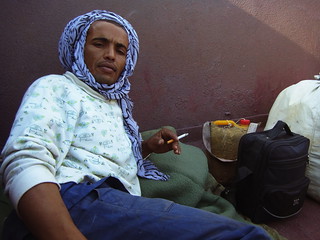
After sunset, it’s time for some socializing. The nameless fellow trainrider has brought a blanket which he spreads out on the floor like a carpet; we all settle down on it and share some peanuts, dates, and water. I try not to eat too much and drink hardly anything at all, since there’s no toilet in this cargo wagon. The only way to relieve oneself is to climb over the edge of the wagon and then hold on to it tightly while you do what needs to be done into the desert, with the violently shaking train moving at a good 50 kilometers per hour. There’s no way I’m going to try that, although the nameless fellow trainrider does it twice and, to my relief, manages to climb back into the wagon both times. It’s dark now, and the nearest street light is probably several hundred kilometers away, but I decide to stand up and have a look

at the desert anyway. I’m absolutely blown away by the view that greets me. My great luck is that the moon is full, and it lights up the pale sand enough to see a couple of hundred meters into the vast night landscape through which we’re making our way. At the horizon, the desert blends into the deep blue sky. It’s the most magical view I’ve ever seen. I don’t know for how long I stand there, staring at the desert; I feel a bit like a silly tourist for it. However, when I finally do look to my left and right, I see Mustapha, the nameless fellow trainrider, and every single person in the other cargo wagons, all silently staring out at this mesmerizing beauty. I’ve never felt a stronger sense of shared humanity in my life, despite the massive cultural differences between myself and everyone else on this train.
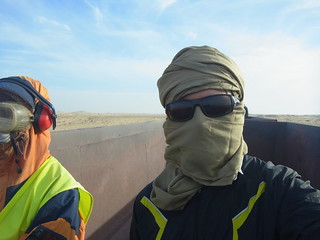
Some two hours after sunset, it’s time to get some sleep. The three of us settle down on the blanket / carpet, and lie down. It’s at this point that the reason why passenger trains were invented becomes clear. Iron ore doesn’t care about deafening noise, or sliding over a rough metal surface, or bouncing up and down, or being covered in dust. All of which is why it’s no problem for iron ore wagons to be open-topped containers of rough metal with zero suspension, sound dampening, or cushioning. Human beings are, I find out, not as tough as iron ore. The dust storm going on inside the wagon and the deafening bangs and clangs and scrapes would be enough to make sleeping a challenge. However, as the night goes on, the train speeds up and the tracks get rougher. When standing up, your legs give just about enough suspension to make it bearable. But when lying down or sitting on the floor, all the shocks of the wagon are transferred directly to our bodies,

making it impossible to sleep; from time to time, my entire body is lifted straight up from the wagon floor and bounces up and down at roughly 45 beats per minute. I try every position conceivable to mankind, but nothing helps. The only relief comes at two or three stops in the middle of nowhere, but since my destination is also in the middle of nowhere, I have to be alert with each stop so that I don’t miss my get-off point. Thankfully Mustapha keeps an eye on our progress. After four hours of trying and failing to sleep, I finally find a magic position that works to minimize the bouncing; but as these things go, five minutes later we reach Choum, my destination. Mustapha helps me negotiate a price for the “taxi brousse” (a pickup truck serving as taxi in places where the track is too rough for regular cars), after which I say a heartfelt ‘merci pour tout’ to both him and the nameless fellow trainrider for their company and assistance.
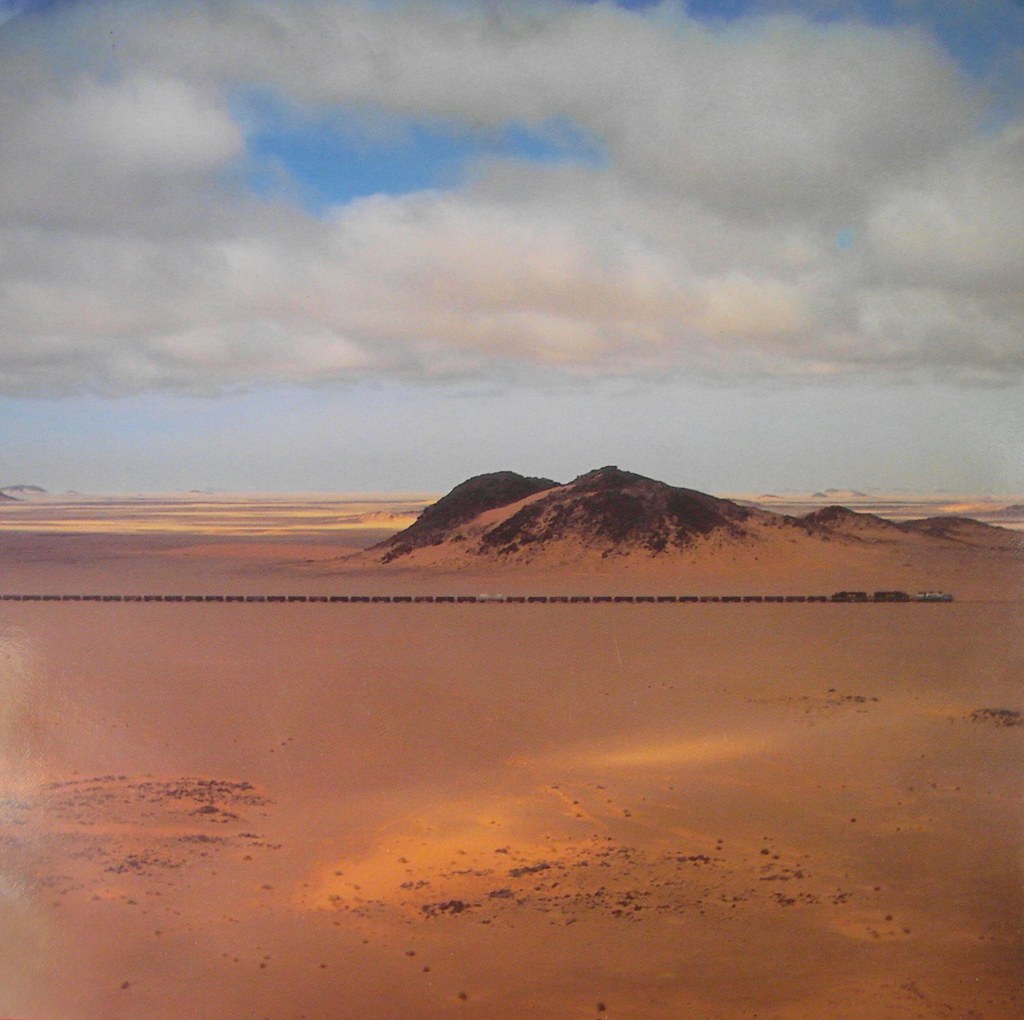
I didn’t take this photo myself (I couldn’t, since I was on the train), but if you imagine this scene in the light of the full moon, you’ll understand how magical it was. Photo is a postcard I found in Mali (oddly enough), copyright j.-ch. plat 2007-2008, Zeineplat@yahoo.fr
The taxi brousse fills up with people and luggage quickly and departs, but a few hundred meters later it stops in the middle of Choum (which is just a collection of some wooden and stone huts in the middle of the desert). A second taxi brousse, also loaded with people and luggage, appears, and the taxi people tell us to get all of the luggage and all of the people in one pickup truck! By the time all the luggage is placed in the rear of the truck, it’s filled to the rim, so the people will have to sit on top of that. I count five people in the cabin and eleven people, including me, on top of the luggage. The women and children are in the middle, and the men are in a half circle around them, legs dangling over the edge of the truck. Thankfully there’s a net keeping the luggage in place, and we can hold onto that. The driver seems clearly inspired by the Dakar Rally which used to pass through this part of the Sahara, and leaves large dust clouds behind as we weave our way back and forth between rocks, scrubs and the occasional thorny tree. We’re entering the Adrar, a mountainous region with slightly more vegetation and variety than the surrounding areas. There doesn’t appear to be a fixed track, but that’s not holding back our driver; he’ll find a route one way or the other. Sitting on the back of the truck, surrounded by traditionally dressed Mauritanians, and with the moonlight still illuminating the desert landscape, it’s again a magical experience. After about an hour, we reach a police checkpoint, truly in the middle of nowhere. The officers are often stationed here for weeks on end, and I’d feel like giving them a tip for their dedicated service, if only they weren’t already so good at extracting bribes. Normally any policeman or soldier in Mauritania would ask me for a “fiche” since I’m a tourist, but with my turban, sunglasses (against the dust, even though it’s 4 in the morning) and cheap wind stopper jacket, I apparently look like a local dressed for train travel; the officer looks straight at me and then moves on to the next person, without asking me anything. The checkpoint marks the beginning of a rough dirt road, and the speed increases to some 70 kilometers per hour. The reduced shaking,
combined with my tiredness and some dehydration from hardly drinking on the train, have me getting extremely drowsy. When I fall asleep, I start to roll forwards and almost fall off the truck – which, given the speeds and the rocks lining the road, would be very dangerous indeed. Thankfully my hands are holding on to the cargo net tightly, and with a shock I wake up, in time to realise what’s happening. There’s just no place to safely lie down on this overcrowded pickup truck, so I’ll have to stay sitting on the edge. However, I’m just so drowsy that I literally can’t stay awake to save my own life, and fifteen seconds later I’m falling asleep again… During the next two hours, this cycle repeats itself at least a hundred times; by the end of it, my hands are covered in blisters from holding on to the cargo net, but at least I’m still on the truck, alive and well. The sun is about to rise, and we make a stop near Azougi. This nondescript little place was once the home base of the Almoravids, a dynasty that would go on to be the founders of Marrakesh, and conquerors of Morocco and Southern Spain and Portugal. Now, it’s where we stop to pray. In Morocco, life went on merrily when the muezzin called the “adhan” (call to prayer) from the mosque’s minarets; people usually wait for a convenient moment to say their prayers, and many don’t make it to the required five prayers a day. Mauritania is different. I had already noticed that the nameless fellow trainrider would dutifully say his prayers in the train wagon; now, the truck stops specifically for the morning prayer, and everyone is getting off and kneeling in the sand to say the prayer. I’ll soon find out that throughout the country, life just comes to a full stop, five times a day, every day. After the morning prayer is done, it’s just a fifteen minutes’ drive in the early morning light until we reach Atar, the capital of the Adrar region and my final destination of the day. Dazed and confused after 8 hours and 400 kilometers on the train, followed by 3 hours and over a hundred kilometers on the pickup truck, I put my backpack on and walk towards the appropriately named Auberge “Bab Sahara” (“gateway to the desert”).
